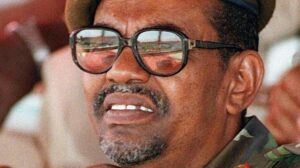By Lisa Vives, Global Information Network
NEW YORK | KHARTOUM (IDN) – In the face of a growing movement of Sudanese opposition, protesting rising costs of bread and other essentials, security forces of the government of President Omar al-Bashir moved forcefully on December 25 to end the demonstrations using tear gas, night sticks and live ammunition, according to witnesses.
States of emergency and curfews have been declared in several of the northeast African country’s protesting cities. The protesters – organized by a group of professional unions including doctors, lawyers, teachers and students and supported by two of the largest opposition parties – are calling for President Omar al-Bashir to step down.
On the sixth day of protests, the Sudanese Professional Association announced plans to hand over a memorandum to the Parliament demanding the regime “give up the political and executive power to the Sudanese people who flooded the cities with their sole demand to end the regime’s 30 years of dictatorship.”
Supporters of the opposition used the occasion of a soccer game over the weekend (December 22-23) to chant slogans and stand up to police, now shooting rubber bullets, said witnesses.
Video from the event showed fans chanting “The people want to bring down the regime” – a popular slogan of the Arab Spring uprisings of 2010 and 2011. The video showed that not all the fans took part.
Sudan is oil-rich, but poverty is rife in the country, with many of Bashir’s critics attributing its economic woes to widespread corruption. Nearly 20 percent of the labour force is unemployed, according to recent International Monetary Fund data; inflation reportedly has soared to nearly 70 percent.
Bashir, who was charged with crimes against humanity, including genocide, by the International Criminal Court related to the Darfur conflict in Sudan in 2010, has been President for almost three decades.
Ironically, the crisis comes as a page was being turned for the controversial leader of Sudan. The U.S. ended two decades of sanctions, new investment was promised and hope was beginning to take shape for an economic rebirth.
But when the President ended fuel and wheat subsidies, reportedly at the suggestion of international lending partners, protests broke out.
One of Sudan’s largest political groups, the Democratic Unionist Party, called on its supporters to join the December 25 march. The Sudanese Conference Party, a small group with an inclusive agenda, also said it supports the march.
Sudan’s doctors, meanwhile, began an indefinite strike on December 24, with organizers reporting a widespread response. The strike is mainly focused on government hospitals, but the organizers said some doctors in private clinics were joining in.
“The Bashir regime has been facing a crisis of legitimacy,” said Zachariah Mampilly, a professor of political science at Vassar College and the author of “Africa Uprising: Popular Protest and Political Change.” [IDN-InDepthNews – 25 December 2018]
Photo: Sudan’s President Omar al-Bashir has been in power since a 1989 coup.


